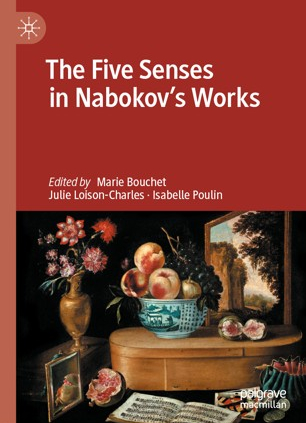Marie Bouchet, Julie Loison-Charles et Isabelle Poulin (eds.)-The Five Senses in Nabokov’s Works
The Five Senses in Nabokov’s Works, eds. Marie Bouchet, Julie Loison-Charles et Isabelle Poulin (Palgrave McMillan, 2020). Vous trouverez la table des matières ci-après/Please find the table of contents below/С оглавлением сборника (на английском языке) можно ознакомиться ниже.
Ce volume collectif s’intéresse à une question largement négligée dans les études nabokoviennes : l’importance et les enjeux des cinq sens dans l’œuvre de Nabokov, du point de vue poétique, politique ou esthétique. Cet ouvrage analyse le rôle crucial que jouent la synesthésie et le multilinguisme en relation avec les cinq sens, ainsi que la place que les dimensions sensuelle et érotique de la sensorialité occupent dans ses écrits. Chaque chapitre présente une approche très ciblée et parfois complètement novatrice sur le rôle unique que les perceptions sensorielles jouent dans la construction et le récit de ses souvenirs ou dans son processus créatif.
This collection of essays focuses on a subject largely neglected in Nabokovian criticism—the importance and significance of the five senses in Vladimir Nabokov’s work, poetics, politics and aesthetics. This text analyzes the crucial role of the author’s synesthesia and multilingualism in relation to the five senses, as well as the sensual and erotic dimensions of sensoriality in his works. Each chapter provides a highly focused and sometimes provocative approach to the unique role that sensory perceptions play in the shaping and narrating of Nabokov’s memories and in his creative process.
Сборник посвящен проблеме, которой до сих пор в набоковедении практически не уделялось внимания – важности и значению пяти чувств в творчестве Набокова, в его поэтических, политических, эстетических взглядах. В книге анализируется ключевая роль синестезии и мультилингвизма и их связь с пятью чувствами, и, кроме того, чувственное и эротическое измерения органов чувств и место, какое они занимают в работах писателя. Каждая глава отличается очень целенаправленным и порой совершенно новаторским подходом к уникальной роли, какую чувственное восприятие играет в конструировании и нарративе набоковских воспоминаний и в его креативном процессе.
Table of Contents
Chapter 1 “‘Do the Senses Make Sense?’: An Introduction”, Marie Bouchet, Julie Loison-Charles, Isabelle Poulin
PART I The Role of the Senses in Nabokov’s Aesthetics and Metaphysics
Chapter 2 “Do the Senses Make Sense?”, Brian Boyd, University of Auckland, New Zealand
Chapter 3 “‘To breathe the dust of this painted life’. Modes of Engaging the Senses in Vladimir Nabokov’s Invitation to a Beheading”, Lilla Farmasi, University of Szeged, Hungary
Chapter 4 “Nabokov’s Visceral, Cerebral and Aesthetic Senses”, Michael Rodgers, West College, Scotland
Chapter 5 “Developing Transnational Style: Particularities of Nabokov’s Lexicon and Cognitive Frames in The Gift in Relation to the Five Senses”, Lyudmila Razumova, King’s College, London, UK
PART II Crossing Sensations and Languages: Multilingualism, Memory and Intermediality
Chapter 6 “An Eden of Sensations: The Five Senses in Speak, Memory”, Damien Mollaret, University of Bordeaux Montaigne, France
Chapter 7 “A Look at the Spectropoetics of Photography in Nabokov’s fiction”, Yannicke Chupin, University of Cergy Pontoise, France
Chapter 8 “Visual Agnosia in Nabokov: When One of the Senses Can’t Make Sense”, Susan Elizabeth Sweeney, College of the Holy Cross, USA
Chapter 9 “Translating Taste and Switching Tongues”, Julie Loison-Charles, University of Lille, France
Chapter 10 “Translation as Craft and Heroic Deed: On the Political Stakes of a Multilingual Sensoriality”, Isabelle Poulin, University of Bordeaux-Montaigne, France
PART III Senses and the Body: from Pleasure to Displeasure
Chapter 11 “Sensuality and the Senses in Nabokov”, Maurice Couturier, University of Nice, France
Chapter 12 “The ‘Eyes’ Have It: The Pleasures and Problems of Scopophilia in Nabokov’s Work”, Julian Connolly, University of Virginia, USA
Chapter 13 “The carmen in Nabokov’s Lolita”, Suzanne Fraysse, University of Aix-Marseille, France
Chapter 14 “‘I’d Like to Taste the Inside of Your Mouth’: The Mouth as Locus of Disgust in Nabokov’s Fiction”, Anastasia Tolstoy, University of Oxford, UK
PART IV Synesthesia and Multisensoriality
Chapter 15 “An Introduction to Synesthesia Via Vladimir Nabokov” Jean-Michel Hupé, Neuroscience Researcher, University of Toulouse, France
Chapter 16 “Neurological Synaesthesia vs Literary Synaesthesia: Can Nabokov Help Bridge the Gap?”, Marie Bouchet, University of Toulouse, France
Chapter 17 “Undulations and Vibrations, Tonalities and Harmonies: Nabokov, Acoustics and the Otherworld”, Sabine Metzger, Stuttgart University, Germany
Chapter 18 “Vladimir Nabokov’s Musico-Literary Microcosm: “Music” and Nabokov’s Quartet”, Kiyoko Magome, University of Tsukuba, Japan
Chapter 19 “‘Tactio has come of age’: the Tactile Sense in Nabokov’s Lolita, Pale Fire and Ada”, Léopold Reigner, University of Rouen, France
Chapter 20 “Embodied Memories in Ada, or Ardor and Speak, Memory”, Nathalia Saliba Dias, Humboldt University, Germany
Chapter 21 “‘A Tactile Sensation is a Blind Spot’: Nabokov’s Aesthetics of Touch”, Lara Delage-Toriel, University of Strasbourg, France



